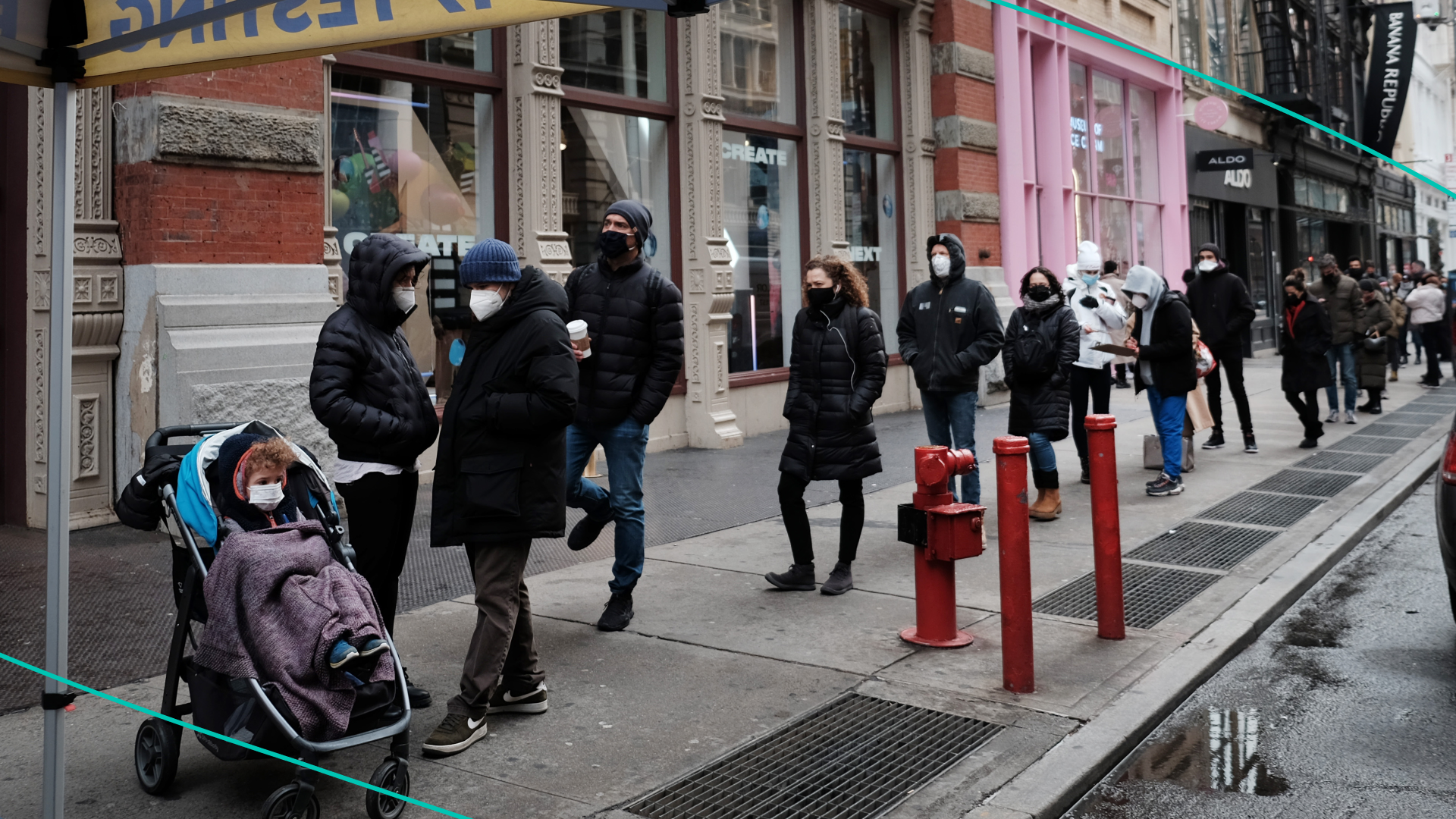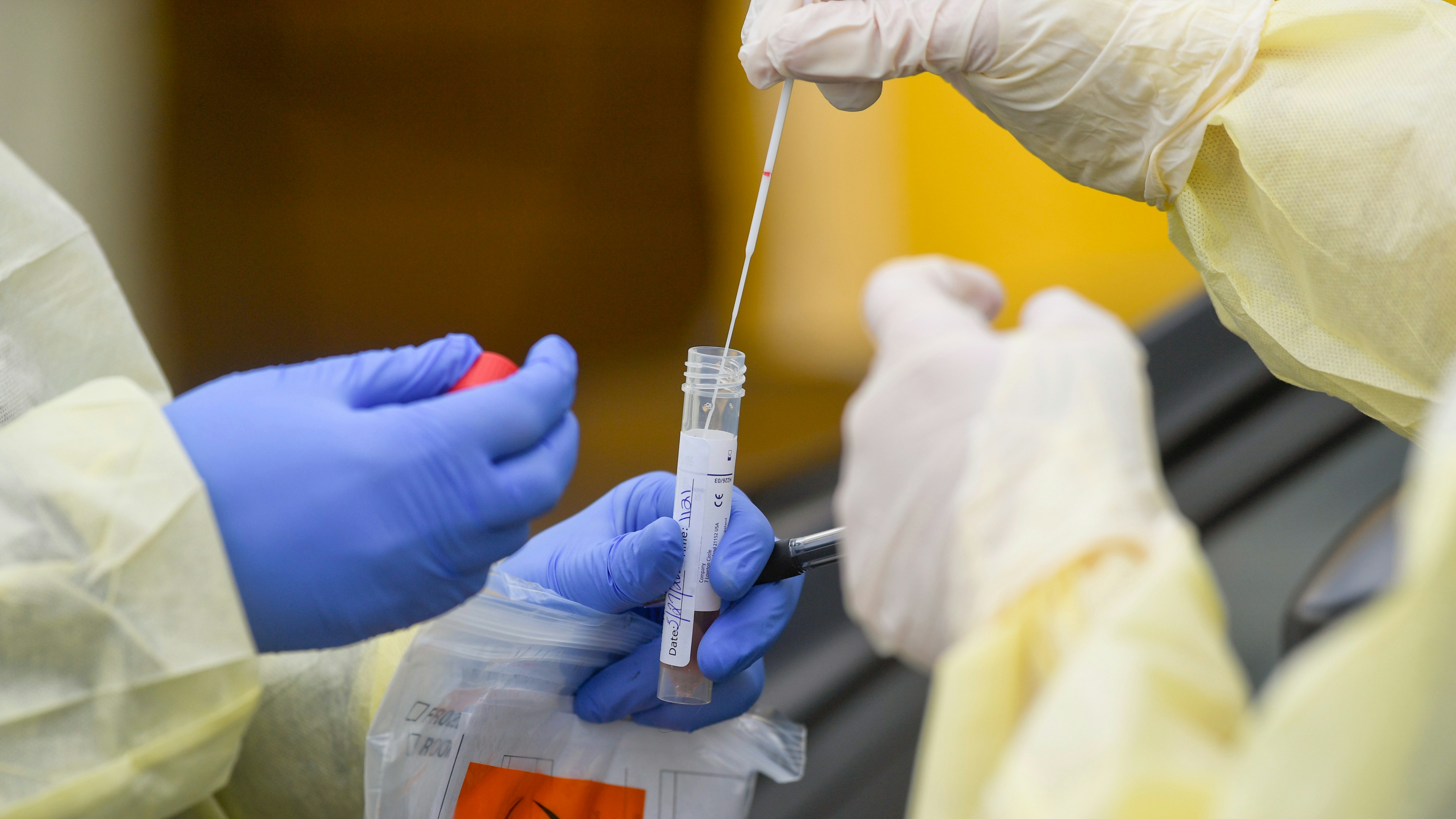In December, Omicron quickly became the new dominant COVID-19 variant in the US — making up nearly three-fourths of new cases. And so far, one known Omicron death has been reported (in Harris County, Texas). But Omicron’s not the only variant that’s around (we still see you, Delta). All of this has experts worried about what it means for the spread of COVID-19 during the holiday season — and the CDC has responded by cracking down on testing requirements for inbound international travel.
Omicron’s arrival has boosted demand for COVID-19 testing, creating long lines and adding pressure to testing supplies. Even the Biden admin is ramping up efforts to make it more accessible. The silver lining: Since 2020, COVID-19 testing options have increased. Now, there are many types that can be used for different purposes (including for diagnostic or antibodies).
Here Are the Types of COVID-19 Tests Available...
Molecular tests (which include the NAAT test and the PCR test) check if you have the virus by looking for the coronavirus’ genetic material in your testing sample. These tests are valid for international travelers coming to the US, per the CDC’s updated testing requirement (as of Dec. 6).
Process: A doctor or medical professional will use a nasal or throat swab to get a sample.
Accuracy: About 95% correct.
Turnaround: Results come back between 45 minutes and three days (subject to change based on demand).
Costs: Usually free across the country (regardless of insurance) if you take it at a drive-thru or walk-in clinic, and some pharmacies. But that’s not always the case at a doctor’s office or urgent care.
Costs for testing in other countries vary. Pro tip: Try Google searching “where to get a COVID test in [insert the country's name here].” TestforTravel.com could also help — it aggregates COVID testing sites in various countries, based on crowdsourcing.
Antigen tests (aka rapid tests) check if you currently have COVID-19 by looking for antigens. This can be a specific protein or one of the spikes the virus uses to latch on to our cells. These tests are the other option for travelers coming to the US.
Process: A doctor or medical professional will use a nasal swab to get a sample.
Accuracy: Rapid tests are less reliable than molecular tests. They correctly produce positive results about 72% of the time in people exhibiting COVID-19 symptoms.
Turnaround: Expect results back in 15 to 30 minutes — hence rapid tests.
Costs: Similar to molecular tests, these can be free at federal and state-run testing centers or at bigger pharmacies (Walgreens, CVS, etc). But you might have to pay out of pocket at private clinics. For out-of-country testing, prices vary.
Antibody tests check to see if you previously had the virus by looking for proteins created by an immune system response (aka antibodies) to the coronavirus. These tests do not determine if you have a current infection because your body starts producing antibodies 1-3 weeks after you get the virus.
Process: A doctor or medical professional will take a blood sample by using an IV or by pricking your finger.
Accuracy: 30-90%. Yes, that is a big range. And it’s dependent on when you take your test. Remember: The longer you wait to take the test after being infected with COVID, the more time your body has to create antibodies.
Turnaround: Expect results in about 1-3 days.
Costs: State and local health departments determine the cost of antibody tests. But your insurance might cover the cost at your doctor’s office, so call before you go.
At-home tests are mostly rapid tests. But can include molecular and antibody tests — which allow test takers to take their sample at home and then send it to a lab for processing. The tests are sold online or at places like pharmacies and supermarkets. Your doctor can also order one for you. (More details on this in the section below.)
Process: Depending on the type of test, you either send your sample to a lab or use an accompanied testing device from the kit you bought to test your sample.
Accuracy: At-home rapid tests are about 72% accurate in people with symptoms, and about 58% accurate in people without symptoms.
Turnaround: Anywhere from 24 to 72 hours after a lab receives it. Or 15-30 minutes at home.
Costs: Anywhere from $20 to $140.
Note: Watch out for fake test kits being sold online by checking if the product you’re using is included in the FDA’s approved devices database.

Omicron and the Increased Demand for Testing
As people prep for holiday gatherings, ‘at-home tests’ have gone to the top of Americans’ holiday wish list. Across the country, people have been flooding stores to get their hands on them. And chains like CVS and Walgreens are limiting the number of tests people can buy IRL and online. Meanwhile, NY AG Letitia James (D) is monitoring potential price gouging amid reports that testing products are being sold at double or triple the price. Here are some things to consider as you ‘add to cart’:
Tests that are available…The FDA has authorized at least 11 over-the-counter at-home tests. And most test kits appear to be effective at detecting the Omicron variant. But supplies are likely to vary. Here are some options to consider:
Abbott BinaxNOW: It comes with two tests — each including a swab, test card, and reagent solution. Results in 15 minutes. Pricing ranges from $14-$24 at pharmacy stores like Walgreens or CVS. Or online at Amazon.
QuickVue At-Home OTC COVID-19 Test: A box includes two tests and provides results in 10 minutes. It costs about $24 and comes with swabs, tubes, and test strips. You can also purchase in person (CVS or Walgreens) or online (Amazon), depending on supplies and location.
Intrivo Diagnostics On/Go: This one pairs with an app (available on Apple and Android) that guides you through the testing process. Results in 10 minutes. And it’s about $30. Order here.
Out of stock? Consider other at-home tests like the iHealth COVID-19 Antigen Rapid Test. The 15-minute test is available on Amazon and iHealth. Or, the BD Veritor At-Home COVID-19 Test (also on Amazon).
Timing for testing…The CDC recommends self-testing if you develop COVID-19 symptoms or have been exposed to someone with the virus. If you’re going to a gathering, health experts recommend taking a test right before the event. Especially if immunocompromised or older people and unvaccinated children are going to be there.
If you test positive, isolate for 10 days and notify people you’ve been in contact with. If you test negative, the possibility of infection isn’t 100% gone. That’s why the CDC suggests doing another at-home test within a few days — at least 24 hours apart.
theSkimm
Vaccines have given us some hope that an end to the pandemic is coming. But the US keeps hitting grim milestones, including surpassing 800,000 deaths and over 51 million cases. Testing can help keep people informed about their health — which could save lives and help prevent the spread of COVID-19. Here's where you can find a vax site or testing site near you.
Updated on Dec. 22 to include info on different testing options and when to take an at-home test.
Updated on Dec. 8 to include new CDC testing requirements for inbound international travel.
Live Smarter
Sign up for the Daily Skimm email newsletter. Delivered to your inbox every morning and prepares you for your day in minutes.
